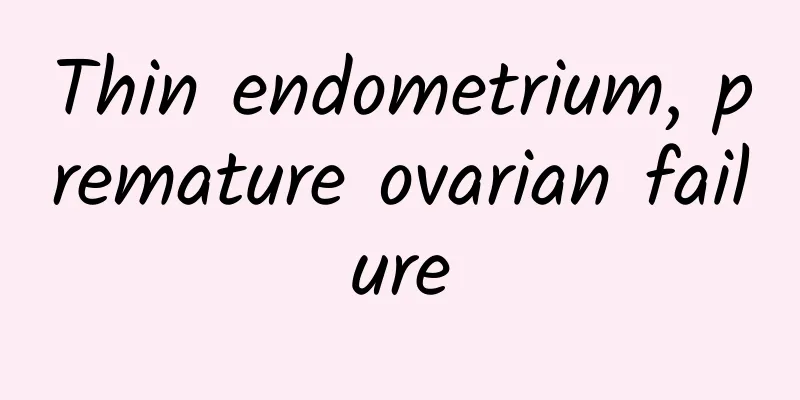Thin endometrium, premature ovarian failure

|
Thin endometrium and premature ovarian failure may lead to infertility or menstrual abnormalities. Targeted treatment is needed according to the cause, and medical examination and intervention should be sought as soon as possible. Thin endometrium is usually caused by insufficient estrogen levels, endometrial damage or reduced blood supply. When the thickness of the endometrium cannot reach about 10 mm, it may affect embryo implantation. Premature ovarian failure refers to the decline of ovarian function before the age of 40. Its common causes include genetic factors such as X chromosome abnormalities, immune system diseases, the effects of radiotherapy and chemotherapy, etc., manifested as symptoms such as infrequent or amenorrhea, decreased hormone levels and even infertility. To make a clear diagnosis, it is recommended that women check hormone levels such as estradiol, follicle-stimulating hormone (FSH), etc., and use B-ultrasound to check endometrial thickness and ovarian reserve function. To treat thin endometrium, estrogen can be supplemented through hormone therapy (such as oral progynova and fentermatone) to promote endometrial thickening, or combined with oral aspirin, vitamin E, etc. to improve blood flow. Traditional Chinese medicine, such as taking Chinese medicine to nourish yin, promote blood circulation and remove blood stasis, can also regulate the endometrial environment to a certain extent. Intervention methods for premature ovarian failure include assisted reproductive technology such as in vitro fertilization (IVF) or egg donation; at the same time, hormone replacement therapy (HRT) can be used to relieve menopausal symptoms, or drugs such as metformin can be used to improve ovarian metabolic function for those with insulin resistance. Maintaining a healthy lifestyle is helpful for endocrine balance and ovarian function. It is recommended to eat a reasonable diet, eat more protein, fiber and high-vitamin foods such as fish, vegetables and nuts; avoid staying up late and obesity, and exercise regularly to improve the body's metabolic function. At the same time, avoid taking medicine privately or losing weight excessively, and regularly check the uterine and ovarian indicators. If you find any problems, consult a doctor in time. Patients with premature ovarian failure should intervene as soon as possible, and choose an appropriate treatment plan based on the cause to preserve fertility. |
<<: Exercises to prevent cervical hypertrophy
>>: How to treat postmenopausal neurological syndrome
Recommend
The main causes of mild cervical erosion
Cervical erosion is a gynecological disease that ...
How long after abortion can I have sex?
How long after an artificial abortion can you hav...
Can women with chronic cervicitis get pregnant? 3 knowledge points about chronic cervicitis in women
Many women suffer from chronic cervicitis, which ...
The difference between miscarriage and ectopic pregnancy symptoms
There are significant differences in the symptoms...
Will menstruation stop if I have ovarian cysts? How can I cure it?
Will menstruation stop if I have ovarian cysts? H...
The main reason why ovarian cysts affect fertility
The impact of ovarian cysts on fertility is the m...
Why do I keep gaining weight if I eat boiled vegetables and no starch? Eat like this to prevent sarcopenia with balanced nutrition
Some seniors would ask nutritionists: "I onl...
How to drain pelvic fluid
Pelvic effusion refers to the abnormal accumulati...
Get rid of stress fat with this nutritionist’s secret 3-minute stress-relieving drink!
Do you also like to relieve stress by eating and ...
Remedies for irregular menstruation
Patients with irregular menstruation can use many...
How long after the abortion can I go back to work?
In recent years, with the development of medical ...
Pregnant women get rid of stretch marks! 3 tips to get your sexy belly back
As the saying goes, men are afraid of stretch mar...
Is there any folk remedy to treat pelvic effusion?
Pelvic effusion is related to pelvic inflammation...
Preparations before painless abortion surgery
Painless abortion is a popular abortion procedure...
Which hospital is the most authoritative for cervical erosion?
With the development of society, changes in life ...









